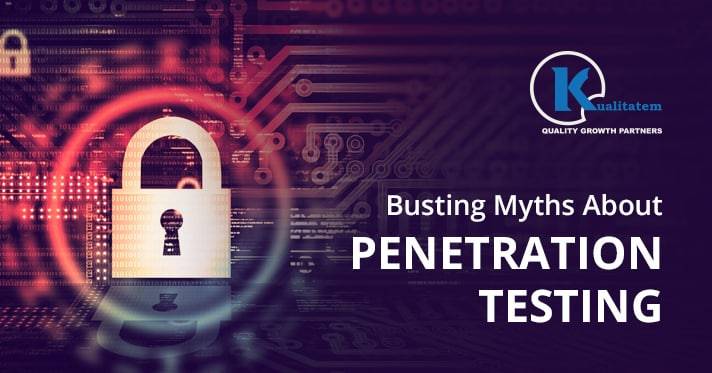Busting Myths About Penetration Testing!

- November 7, 2019
- HibaSulaiman
Penetration testing is an integral part of information security. It helps organizations detect loopholes in the security system before fraudsters exploit them. Despite its well-known benefits, some organizations happen to believe in myths that need to be debunked. In this article, we’ll list down 8 of the most popular myths associated with penetration testing and explain why they are not true.
1) Penetration Testing is Another Term for Vulnerability Assessment
There is a difference between both of them. Penetration testing simulates an attacker’s actions and provides a detailed report on how the attacker compromised the security system. Whereas, vulnerability assessments include identifying and classifying known vulnerabilities, producing a list of prioritized flaws that require attention and recommending ways to fix them.
2) Automated Security Testing is Just as Good as Manual Penetration Testing
Many organizations use a mix of automation and human-driven security testing. But both of them have different impacts. Automated testing is not penetration testing. Human involvement in security testing provides invaluable insights regarding the motives of the attacker and how the system can be breached. It takes into account human factors such as experience, creativity, and curiosity which a machine cannot.
3) Penetration Testers Must be Ignorant of the Systems They Target
It’s better to be well-informed about the system you’re targeting rather than knowing nothing. Although, in both cases, penetration testing can be performed, understanding the system before the attack narrows down the target points and provides additional insights.
4) Penetration Testing is an Optional Luxury for Big Companies
Some laws and industry standards require penetration testing. For example, healthcare providers conduct tests to ensure that they adequately protect medical data. Banks also conduct penetration testing to protect sensitive financial data. Attackers don’t differentiate between big and small companies. Most of the data breaches accounted for are in SMEs that believe in this myth.
5) Penetration Testing is Always Proactive
Yes, some organizations realize too late. Although, penetration testing is perceived to be a vaccine rather than an antibiotic, penetration testing during post-breach forensic analysis can help security teams understand what happened and how — information that can also help an organization prevent similar breaches in the future.
6) Penetration Testing Disrupts the Business
Businesses fear disruption of the day-to-day process because of penetration testing. Although testers use the same techniques and methods real cyber-criminals use, a reputable penetration testing company will aim to safely identify and exploit flaws across any in-scope networks, system, and applications without impacting critical operations.
7) Penetration Testing is too Expensive
Penetration testing requires highly skilled technical personnel and depending on the project, it can often take days per test. To cater to wide-ranging needs, a good penetration testing company will customize the testing according to business and budgetary requirements. Therefore, if you have a small budget, testing can be focused on areas that are likely to offer the greatest return.
8) Penetration Testers will Compromise Sensitive Data
Businesses fear that penetration test is nothing more than a scam and testers will actually either steal the data or uncover weaknesses for others to exploit. This is where cybercriminals and ethical hackers are being confused with one another. Ethical hackers are trained cybersecurity professionals and a responsible penetration testing company will ensure the protection and privacy of organizational data. However, it is still vital to only work with the company you can trust.
Conclusion
Some myths are harmless and some are not. Latter is the case when it comes to penetration testing. Misconceptions about penetration testing can lead to organizations ignoring it and subsequently bearing the cost. Cybercriminals are getting advanced day by day and so should you. Otherwise, they will happily feed on the misconceptions.











